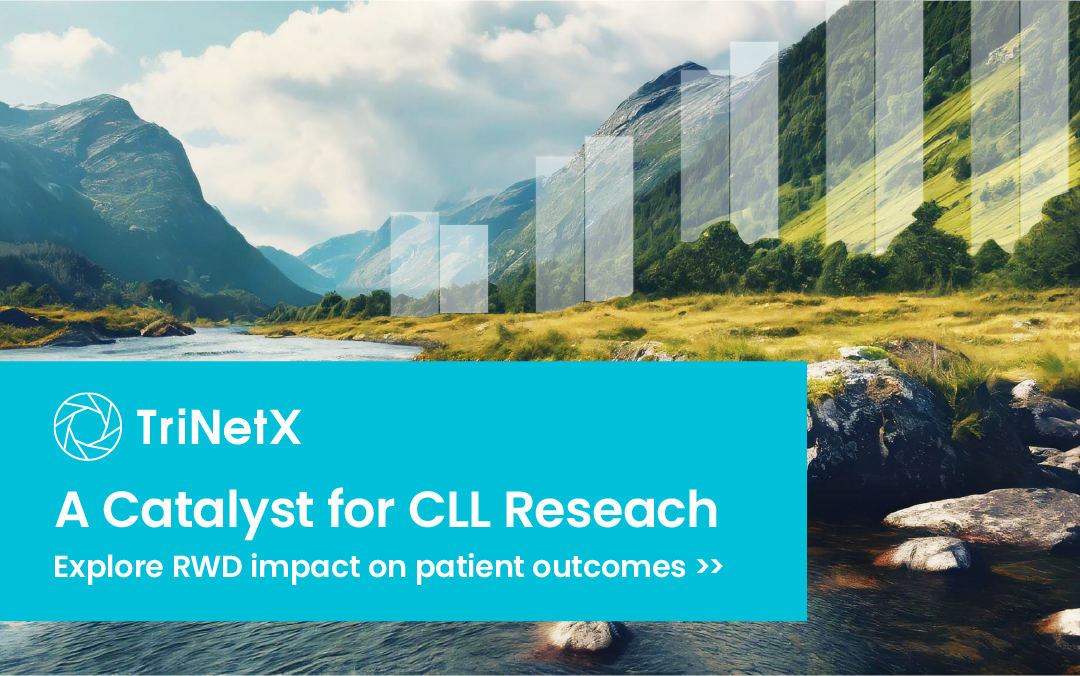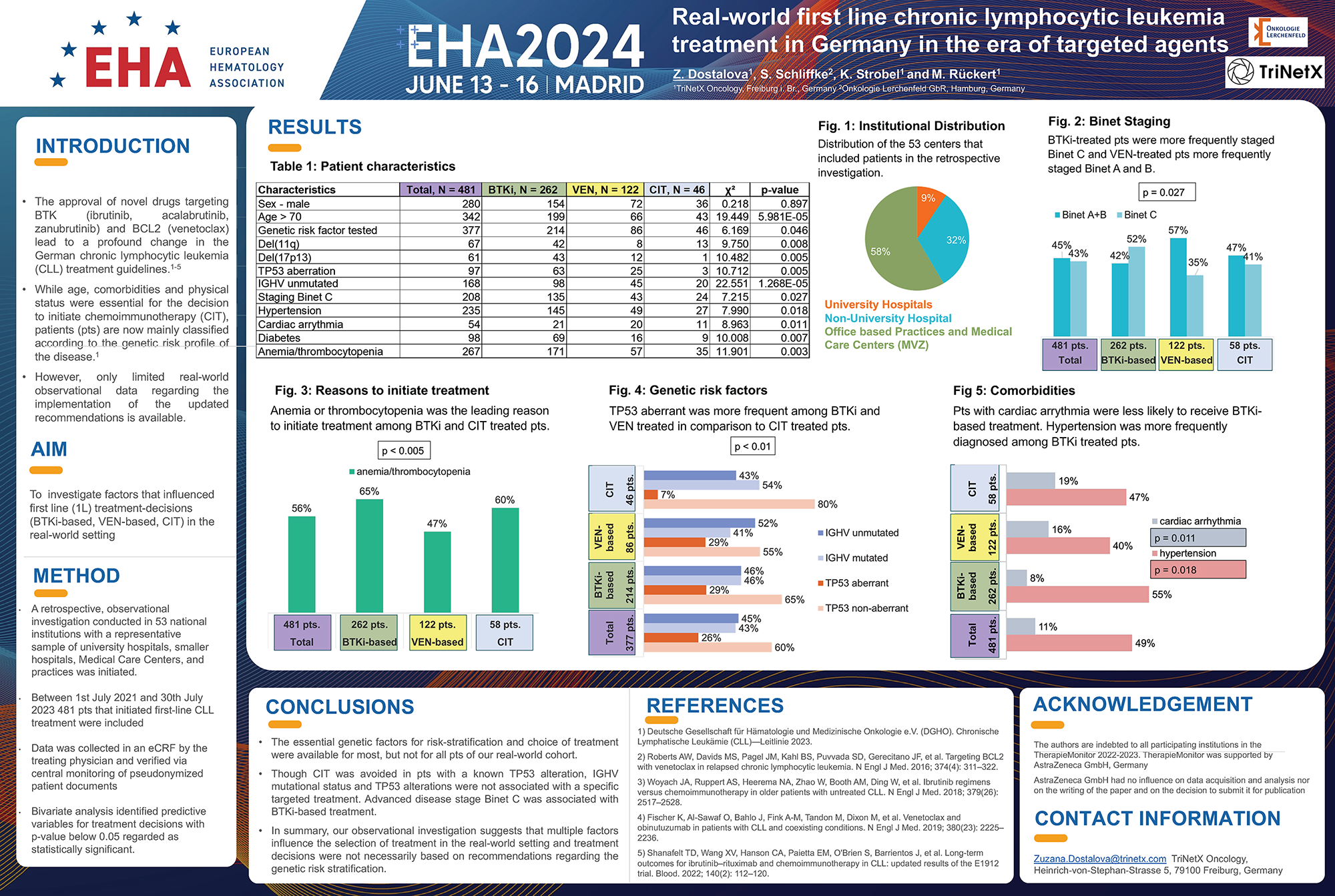Chronic Lymphocytic Leukemia (CLL), a type of slow-growing cancer of the blood and bone marrow, accounts for 25-30 percent of all leukemia in the Western world and is the most common type of leukemia in adults, with over 100,000 new global incidence cases and over 40,000 death cases reported globally in 2019.
Real-world data (RWD) has emerged as a powerful catalyst in CLL research, significantly enhancing our understanding and treatment of this complex disease. By leveraging information derived from everyday clinical practice, patient experiences and various healthcare sources, researchers and clinicians can now gain invaluable insights that were previously inaccessible through traditional clinical trials alone.
RWD in Action at TriNetX
Recently, the TriNetX Oncology team and their partners harnessed the power of RWD in a retrospective observational study to investigate the factors influencing first-line (1L) treatment decisions for CLL in a real-world setting in Germany. The study was prompted by the approval of new drugs, including ibrutinib, acalabrutinib and zanubrutinib, which target Bruton’s Tyrosine Kinase (BTK), and venetoclax, which targets B-cell lymphoma 2 (BCL2). In the context of CLL, BTK and BCL2 are key proteins involved in the disease’s pathogenesis and treatment.
Prior to the TriNetX research study, limited observational data was available on the implementation of these new drugs for the treatment of CLL in actual clinical practice.
We spoke with Zuzana Dostalova, Data Scientist at TriNetX Oncology, about the research study — Real-World First Line Chronic Lymphocytic Leukemia Treatment in Germany in the Era of Targeted Agents — which was presented as an e-poster at the European Hematology Association (EHA) 2024 Congress, held in June 2024 in Madrid, Spain.
How does your work impact the field of CLL research? Is it a global impact?
This research provides valuable insights into the real-world application of new CLL treatment guidelines. It highlights that multiple factors influence treatment decisions beyond the genetic risk stratification, such as the stage of the disease, patient comorbidities and other clinical considerations.
While the study is focused on Germany, the findings could have implications for other regions with similar treatment protocols, thereby potentially influencing global CLL research by emphasizing the complexity of treatment decision-making in clinical practice.
How will this research benefit/impact clinical trial sponsors? CLL patients?
For clinical trial sponsors, this research underscores the importance of considering a broader range of factors when designing trials and evaluating treatment efficacy. It suggests that RWD should be incorporated into clinical trial designs to better reflect actual clinical practices and patient populations.
For patients, the findings may lead to more personalized and effective treatment strategies, as understanding the diverse factors influencing treatment decisions can improve the alignment of treatment protocols with individual patient needs.
Why is TriNetX uniquely positioned to conduct CLL research?
TriNetX has an extensive network and capabilities in RWD collection and analysis. Our organization has access to a broad range of clinical data from numerous institutions, including university hospitals, smaller hospitals, medical care centers and practices.
This enables a comprehensive and representative analysis of treatment patterns across different settings, which is critical for understanding the real-world application of updated CLL treatment guidelines.
Additionally, TriNetX’s curated longitudinal granular data allow the derivation of insights that drive innovations and create meaningful healthcare solutions.
What’s next? Any plans for this CLL research and the findings?
The results presented at EHA clearly demonstrate the richness and depth of our collected data, which will allow for deeper investigations. Future research could focus on longitudinal outcomes to assess the long-term efficacy and safety of the various treatment strategies identified. Additionally, we plan to investigate these real-world findings in comparison with clinical guidelines to ensure they reflect the complexities observed in actual practice.
Areas of exploration may include:
- Investigating the impact of patient demographics and comorbidities on treatment outcomes.
- Conducting subgroup analyses of risk groups to further characterize populations with high unmet medical needs.
- Conducting comparative effectiveness research to determine the best treatment options for specific patient subgroups.
- Leveraging advanced analytics and artificial intelligence (AI)-powered machine learning to uncover predictive markers for treatment response and disease progression.
TriNetX Impact on Chronic Lymphocytic Leukemia (CLL) Research at EHA
See the TriNetX impact on CLL treatment for improved patient outcomes in the EHA 2024 e-poster below and learn more about how our robust real-world data sets and analytics can power your research efforts.

About Zuzana Dostalova
As a Data Scientist at TriNetX Oncology, Zuzana focuses on innovation and data quality to transform raw data into meaningful insights that support cancer research and patient care. By leveraging data science, she addresses challenges in oncology and ensures high standards of data accuracy and reliability. Zuzana collaborates closely with researchers, clinicians and other data analysts to produce scientifically robust and clinically applicable findings.
Let’s Connect
Continue the conversation around RWD and enhance your research findings with our TriNetX experts.


